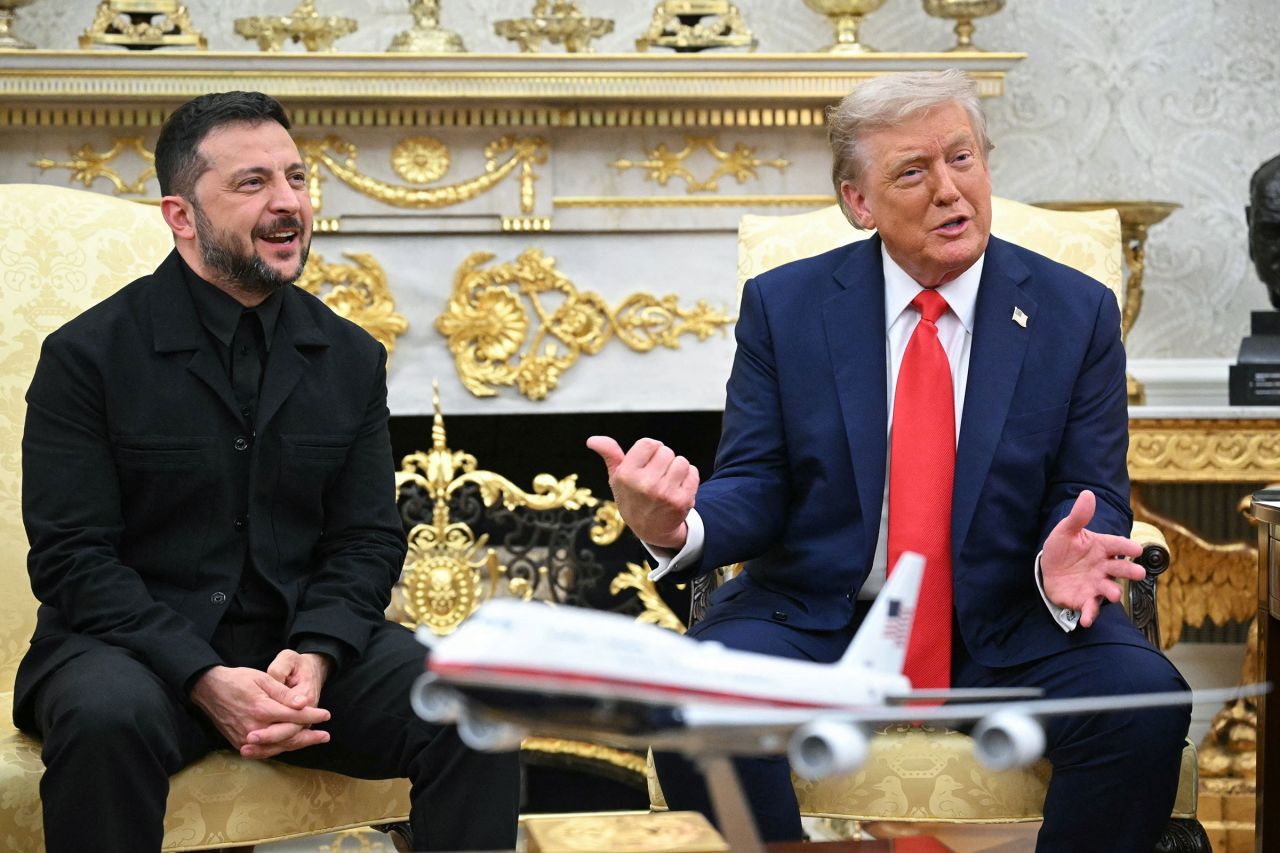Presidents, prime ministers, and heads of NATO and European Commission arrived in Washington on Monday for Volodymyr Zelenskyy’s meeting with US President Donald Trump in the Oval Office, in a show of support for the Ukrainian president.
It comes amid expectations that Trump will try to bully Zelenskyy into accepting a pro-Russia “peace plan” that would include Kyiv handing territory to Moscow.
According to a report by The Guardians, Europeans have been described as Zelenskyy’s “bodyguards,” with memories fresh of the mauling he received in February during his last Oval Office visit. But who are these bodyguards?
Nato Secretary General Mark Rutte
Rutte has a proven record of flattering Trump for strategic purposes, using language that some allies find cringe-making. In June he referred to the capricious US president as “Daddy” in an attempt to avoid disastrous outbursts at the Nato summit.
Rutte has repeatedly praised Trump in public, including in a recent interview on Fox News, and credits him for pushing NATO members to spend 3.5 per cent of their GDP on defence. The US had carried the burden of European security for too long, Rutte has said – music to Trump’s ears.
European Commission President Ursula von der Leyen
Von der Leyen is a staunch supporter of Ukraine who backs Kyiv’s EU membership. For Trump, she is a reminder of Europe’s combined importance as an economic bloc.
The US struck a trade deal with the EU three weeks ago, and Trump hailed the relationship as “the biggest trading partnership in the world”.
On Sunday she hosted Zelenskyy in Brussels. She said a post-peace-deal Ukraine had to become “a steel porcupine, indigestible for potential invaders”, with no limits on its armed forces.
UK Prime Minister Keir Starmer
Starmer has performed a balancing act when it comes to Trump, keeping him on side while advocating for Ukraine. So far, this tactic has worked. The US president has gone out of his way to emphasise their good relations, despite Starmer’s “liberal” outlook.
Both men have an incentive to preserve this rapport ahead of Trump’s state visit next month to the UK.
Meanwhile, Starmer and Zelenskyy have developed a warm personal relationship, hugging in February outside Downing Street after Zelenskyy’s previous, disastrous Oval Office meeting, and again last week.
The prime minister stresses territorial integrity, which contradicts Trump’s “peace deal” that involves Russia taking more Ukrainian land.
Finland President Alexander Stubb
Stubb represents a small European state but he will be in Washington because he has managed to establish an unexpectedly warm relationship with Trump.
The Finnish leader cultivated his access to the US president by hastily polishing his rusty golfing skills before an impromptu trip to Florida in March for a round with Trump, on the recommendation of the Republican senator Lindsey Graham.
Stubb’s message on the putting green: you can’t trust Vladimir Putin. Finland sees parallels between Ukraine’s plight and its own history, the Soviet Union having invaded in 1939, saying it needed Finnish territory.
French President Emmanuel Macron
Macron combines French economic and military clout with a proven ability to get on with Trump, symbolised by their intense handshakes. In the lead-up to Russia’s 2022 invasion, Macron flew to Moscow to reason with Putin.
He has since become a key diplomatic ally for Ukraine. Asked on Sunday whether Putin wanted a genuine peace deal, Macron replied, “No.”
He further said, Ukraine needed a strong army and security guarantees if a lasting settlement was to be achieved.
The French president will want to persuade Trump that his post-Alaska-summit plan to stop the fighting is a non-starter, and against Ukraine and Europe’s long-term security interests.
German President Friedrich Merz
Merz has cut a sure-footed figure on the world stage since taking office in May, including largely holding his own in an Oval Office face-off with Trump over the summer.
He has emerged as a crucial partner for Zelenskyy, who was often frustrated with Merz’s slow-moving predecessor, Olaf Scholz. Berlin has clout as one pillar of the French-German axis at the heart of the EU. It is also a major financial donor to Kyiv.
Merz’s task in the Oval Office is to persuade Trump not to act hastily and “over the heads of Ukrainians and Europeans,” as he put it last week.
Italian Prime minister Giorgia Meloni
Meloni has broken off from her holiday to fly to Washington, a sign that Trump’s Russia-friendly “peace plan” marks a moment of danger for Europe. She will be a useful bridge in the Oval Office meeting, as a European far-right leader whom Trump counts as a friend.
Meloni has spent time at Mar-a-Lago, the US president’s Florida home, and was the only European leader invited to his inauguration in January. At the same time, she strongly supports Kyiv’s sovereignty.
In July she hosted a Ukraine recovery conference in Rome, designed to help the country rebuild when Russia’s war finally ends.
What’s at stake?
United States President Donald Trump will host Ukrainian President Volodymyr Zelenskyy and other European leaders for high-stakes peace talks at the White House. The meeting will begin on Monday at 1:15pm local time in the Oval Office.
After a summit in Alaska last Friday with his Russian counterpart, Vladimir Putin, Trump suggested on Sunday that a peace agreement could come quickly if Zelenskyy cedes eastern Ukraine’s Donbas region to Russia.
That summit had ended with no peace deal despite high hopes leading up to it.
One of the most important items on the agenda will be Putin’s territorial demands in Ukraine. To date, Zelenskyy has refused to consider the possibility of ceding Ukrainian territory to bring about peace.
But accepting Russia’s de facto control of Ukrainian territory, notably of the Donbas, would be easier to swallow if accompanied by US guarantees of Ukraine’s future security.


